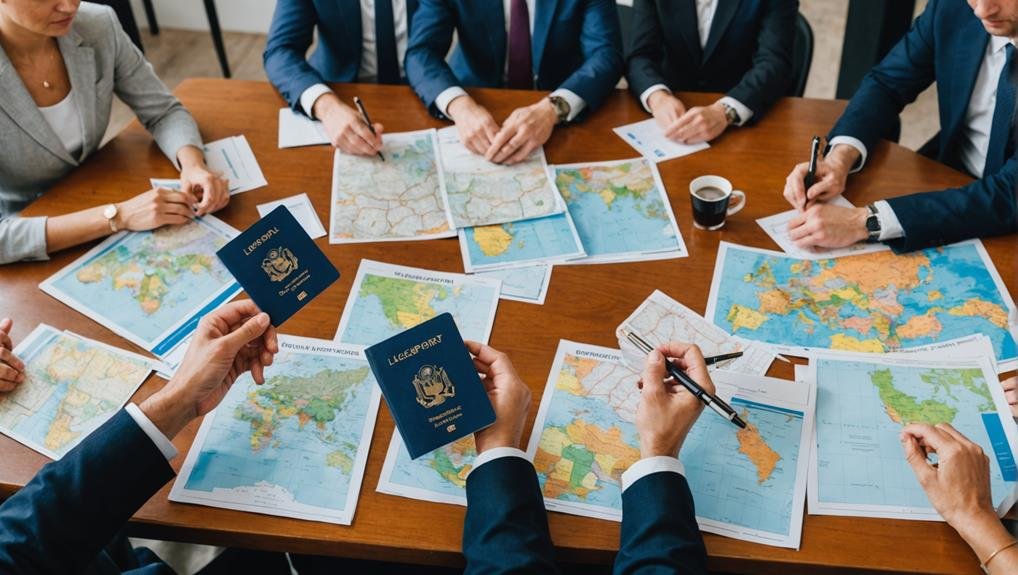When considering buying property abroad, navigating a maze of legalities, financing, and local customs is vital. You must understand foreign ownership laws, consult legal experts, and guarantee compliance with property regulations. Another key step is exploring financing options, whether through overseas mortgages or leveraging your existing credit. Don’t overlook the importance of working with local real estate agents who can provide valuable insights and transparency in transactions. But how do you guarantee you’re not falling into common traps or scams? Let’s explore the essential tips to make your property-buying journey smooth and secure.
Key Takeaways
- Consult legal experts to understand foreign ownership laws and secure legal representation.
- Engage a local real estate agent for market insights and property evaluations.
- Investigate mortgage options, exchange rates, and budget for all expenses, including closing costs.
- Verify property ownership, conduct due diligence, and consult professionals to avoid scams.
- Hire a property manager for routine maintenance and rental management, especially for absentee ownership.
Reasons to Buy Overseas

Buying property overseas can be a wise move when diversifying your investment portfolio. International real estate investment opens up opportunities for potentially higher returns than domestic markets. By exploring the most affordable places to buy property, you can maximize your investment potential while enjoying a lower cost of living.
As a potential buyer, you’ll find that owning foreign real estate offers more than just financial benefits. It can also provide an avenue for expat adventures and new cultural experiences. Imagine having a vacation home in a charming European village or a beachfront property in Southeast Asia. Such investments can enrich your life while growing your wealth.
However, before diving into the world of international real estate, it’s important to understand the foreign ownership laws of your chosen country. Each nation has its own set of regulations that can impact your purchase. Knowing these laws in advance ensures a smoother buying process and helps avoid any legal pitfalls.
Research Local Laws
Understanding the allure of owning property overseas is just the beginning; now, you need to focus on the legal landscape of your target country. Getting a grip on foreign ownership laws and property rights is important before making any commitments. Different countries have varying legal requirements for noncitizen buyers, and you need to know these specifics to avoid potential pitfalls.
Here are four essential steps:
- Understand Foreign Ownership Laws: Research foreign ownership laws in your chosen country. Some places impose strict limitations on land ownership by noncitizens or offer only leasehold rights instead of full ownership.
- Consult Legal Experts: Engage with legal professionals familiar with local real estate laws. They can help you navigate the complexities and comply with all property ownership regulations.
- Stay Informed: Keep up-to-date with any changes in property ownership regulations. Laws can change, and staying informed will help you protect your investment.
- Check for Restrictions: Investigate any restrictions on property rights and legal requirements specific to noncitizen buyers. Knowing these details will help you make an informed decision and avoid legal headaches later.
Financing Options

Securing financing for purchasing property abroad can be complex but manageable. Start by considering an overseas mortgage through a local bank or an international lender. Many global banks, like HSBC, allow you to leverage your existing credit details to access financing options for properties in various countries. This could simplify the process, especially when dealing with foreign exchange rates and different deposit requirements.
Another viable option is to release equity from your current home. Equity release can provide the necessary funds without securing a new mortgage.
Alternatively, using savings can be a straightforward way to avoid borrowing altogether. However, be sure to understand the full financial landscape, including potential tax implications in your home country and the country where you’re buying.
When applying for an overseas mortgage, you must comprehend the deposit percentages required and how your residency status might influence the terms. Non-residents often face higher deposit requirements and different interest rates.
Carefully consider these aspects and consult with financial advisors familiar with international real estate to navigate these complexities.
Real Estate Agents
Exploring the complexities of purchasing property abroad often benefits from the expertise of local real estate agents. These professionals can provide invaluable insights into the foreign real estate market and help you navigate local laws and regulations. Working with reputable agents expedites the buying process and ensures greater property transaction transparency.
Here are some key advantages of working with real estate agents:
- Local Expertise: Real estate agents possess in-depth knowledge of the local market, aiding you in finding the best properties and neighborhoods to match your needs.
- Navigating Legalities: Professional real estate agents understand the intricacies of foreign laws and ensure that all legal aspects of the property transaction are handled correctly.
- Negotiating Deals: Agents are skilled at negotiating deals, often securing better terms and prices for their clients than you might achieve alone.
- International Affiliations: Agents with international connections offer a broader range of property options and have networks that can provide additional support and expertise.
Evaluating Properties

When evaluating properties abroad, it’s important to assess the location, amenities, and proximity to essential services to determine their true value. Start by considering the property’s condition, age, and any necessary repairs or renovations. A thorough property inspection can reveal hidden issues that might affect the property price and your overall investment returns.
Next, consider the property’s potential for rental income or resale value. If you plan on renting out the property, a desirable location with good amenities can greatly boost your rental income. Evaluate the local real estate market to understand average rental prices and demand. This will help you gauge whether the property will generate steady returns.
Local regulations are another key factor. Ensure the property complies with zoning laws, environmental regulations, and safety standards. Ignoring these can lead to costly fines or legal issues down the line. Consulting with a real estate agent who understands the local market and regulations can provide valuable assistance.
Financial Considerations
Buying property overseas involves complex financial considerations that can greatly impact your investment. Navigating the economic landscape of real estate in another country requires careful planning and thorough research. Here are some key points to help you manage your finances effectively when purchasing property abroad:
- Mortgage Availability: Investigate financing options and mortgage accessibility in the country where you’re buying. Different countries have varying regulations and interest rates, which can influence your financial commitment.
- Unforeseen Expenses and Additional Installations: Budget for unexpected costs that might arise during purchasing. These can include additional installations or renovations required to make the property livable or up to your standards.
- Closing Costs: Don’t forget to consider closing costs, including legal fees, taxes, and other charges. These costs can vary significantly from one country to another, so it’s crucial to understand them upfront.
- Foreign Exchange Solutions: The currency exchange rate can significantly impact your mortgage payments and overall investment. Research and compare foreign exchange solutions to ensure you get the best rates and save money in the long run.
Legal Processes

Managing the financial aspects of purchasing property abroad sets the stage for understanding the legal intricacies involved. Securing legal representation is critical When diving into an overseas real estate transaction. An attorney will navigate the legal processes and protect your interests, especially in unfamiliar legal systems where potential legal issues can arise.
It’s easy to overlook important details, but a seasoned lawyer guarantees that every aspect of your transaction is examined. They help translate and clarify key documents, ensuring no room for misinterpretation. Agreement clarity is essential; having professionals translate these documents ensures you fully understand the terms and conditions.
In overseas property transactions, the legal landscape can vastly differ from what you’re used to. Without proper guidance, you might face pitfalls that could jeopardize your investment.
Your legal representative will watch for potential legal issues, ensuring a smooth and lawful purchase process.
Property Management
Exploring property management abroad can be intimidating, but hiring a professional property manager can alleviate many challenges. Having someone on the ground to handle maintenance and rental management is invaluable when dealing with absentee ownership. A property manager will oversee bills, cleaning, and general upkeep, ensuring your investment remains secure and well-maintained.
Here are some key benefits of professional property management:
- Maintenance: A property manager will promptly ensure routine maintenance and repairs, minimizing costly damage over time.
- Rental Management: They can coordinate rental arrangements, from finding tenants to managing leases, guaranteeing a steady income stream even when you’re not around.
- Peace of Mind: Knowing that your property is in good hands while you’re away provides invaluable peace of mind. You’ll rest easy knowing it’s secure and well-maintained.
- Local Expertise: Property managers often have local knowledge and connections that can be crucial in efficiently handling any issues.
Avoiding Scams

Exploring the world of international real estate can be thrilling, but it’s important to be vigilant to avoid scams. When buying a house or any overseas property, you must verify property ownership and title deeds to prevent falling victim to fraudulent schemes. Conduct thorough due diligence on sellers and developers to avoid being misled by false promises.
High-pressure sales tactics or unrealistic offers can be red flags, indicating potential risks of a scam. Don’t rush into decisions, no matter how appealing the deal seems. Instead, take your time to consult with reputable real estate agents or legal professionals. They can help you navigate potential risks and verify the legitimacy of the property.
Researching local laws and regulations is essential to understand the common scams in the real estate market you’re entering. This knowledge will help protect you from fraudulent activities. Remember, due diligence is your best defense against scams when dealing with overseas property.
Planning for Retirement
Planning for retirement with an overseas property can be an exciting venture. It offers both financial benefits and a dream lifestyle. To make the most of this opportunity, you should consider several key factors to ensure a smooth transition and a comfortable retirement.
- Explore Rental Income: Renting out your overseas property during retirement can cover annual costs and generate additional income. This strategy can help you maintain financial stability.
- Hire a Property Manager: A professional property manager can handle bills, cleaning, and maintenance while you’re away. This guarantees that your property remains in good condition without adding stress to your retirement.
- Research Retirement Destinations: Look into top retirement destinations like Mexico, which is known for its favorable living conditions and cost-effective options. Staying informed about various locations can help you select the best spot for your retirement.
- Plan for Property Management: Efficient property management is vital when owning property abroad. Ensure all aspects, from maintenance to legal compliance, are well-handled to avoid any issues during retirement.
Conclusion
Buying property abroad can be rewarding if you take the right steps. Research local laws, secure the best financing options, and work with trustworthy real estate agents. Don’t skip evaluating properties thoroughly; consult legal experts to guarantee compliance. Consider professional services for translation and property management to streamline your process. By being diligent and cautious, you’ll be well-prepared to navigate foreign real estate and make a sound investment.
FAQs
1. Is It a Good Idea to Buy Property in Another Country?
Yes, buying property in another country can be a good idea. You’ll diversify your investment portfolio, enjoy lower living costs, and explore new cultures. Just make sure you understand foreign laws and work with reputable agents.
2. Do US Citizens Pay Property Tax on Foreign Property?
Yes, you do. US citizens must pay property tax to the country where the property is located and potentially to the US government. You should consult a tax professional to navigate these obligations and avoid double taxation.
3. Do US Citizens Pay Property Tax on Foreign Property?
Yes, you do. US citizens must report and pay taxes on worldwide income, including foreign rental income. You might qualify for a foreign tax credit. Always consult a tax professional to navigate these obligations and avoid penalties.
4. How Can You Avoid Tax on Foreign Property?
You can avoid tax on foreign property by researching tax treaties, setting up tax-efficient structures like corporations or trusts, consulting with a tax advisor, and staying informed on local laws. You should also always explore strategies to reduce capital gains taxes.

